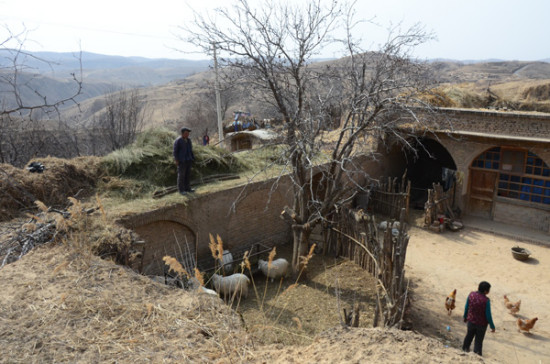
Wang Minghou was one of only five people in March who decided to continue living in the village of Gedongmao, Shaanxi province.(Photo by Wang Jian/for China Daily)
As small communities lose people, those left behind feel lonely, isolated
The pace of urbanization in China during the past 25 years has seen the decline of many villages. As people have drifted away to urban areas, those left behind feel lonely and isolated.
Wang Minghou, 57, is a farmer who has lived all of his life in Gedongmao, a village in Hengshan county, Shaanxi province. His village was once home to more than 200 people, but only five remain. He rejects the idea of moving to an urban area.
"We do not want to live outside of our village because our roots are in the mountains," Wang said.
Gedongmao is in the Baiyu Mountains that border the Loess Plateau. Villagers lived by growing crops on the poor farmland.
In the 1990s, an increasing number of villagers left to seek new lives.
The remaining five say the unbearable part of their existence is not poverty but loneliness.
A road no more than 3 meters wide connects the village to the nearest township, a journey that takes 40 minutes by car.
"It is better than it was before," Wang said, "Until the road was built some 10 years ago, we could not leave the village when it rained or snowed."
Despite knowing that living conditions in a town would be much better than those in his village, he remains unconvinced that he should move.
"We could not keep livestock in a town and I would find it hard to get a job at my age and with no skills, so I think we'd better stay at home and plant the farmland," he said.
Gao Shenghua, Wang's 56-year-old wife, also feels lonely in the village but has to stay with her husband to take care of him.
The couple plant some 3.3 hectares of farmland, and their annual income is 10,000 yuan ($1,612), which "is enough to meet our living costs," Wang said.
Every weekend, Wang rides his motorcycle to the town about 19 km away to buy household goods and vegetables. But he lacks transportation to take his produce out of the village.
"There are more than 2,000 kg of potatoes stored in our cellar," he said. "We could not transport them to sell them."
The couple's children — two sons and one daughter — have settled in the county seat of Hengshan to enjoy a better standard of living. The children keep asking their parents to come and live with them. But Wang chooses to stay.
"I was born in the village and have deep feelings about the house, the trees and the farmland here. Now, despite the remote location, the village is linked by a road. TV and the phone link us with the outside world. We are supplied with power, which makes life more convenient," he said.
Wang has also remained in the village to take care of the old houses that have been vacated. He does not want the village to become deserted.
This has been the fate of many villages due to China's fast urbanization. Majiashan in neighboring Zizhou county became deserted in 2005 as its 176 villagers moved out.
Gao Mouzhou, a professor of urban and rural development at Yulin College, said the rural depopulation of Hengshan and Zizhou counties is reasonable.
"It is in line with the general trend of urbanization and the functional position of northern Shaanxi designed by the central government," Gao said.
Zhou Jinming, an agricultural official with the Yulin government, agreed with Gao's analysis and suggested that the government should focus on supporting large villages by improving conditions, such as setting up libraries and clinics.
Gao suggested that the government should promote the establishment of land cooperatives and encourage villagers to transfer their operating rights for the farmland to the cooperatives for agricultural development.
"The villagers can gain profit from the cooperatives, and the farmland can be fully utilized for agriculture, forestry, animal husbandry, cultivation of Chinese herbal medicine and rural tourism," he said.
















































